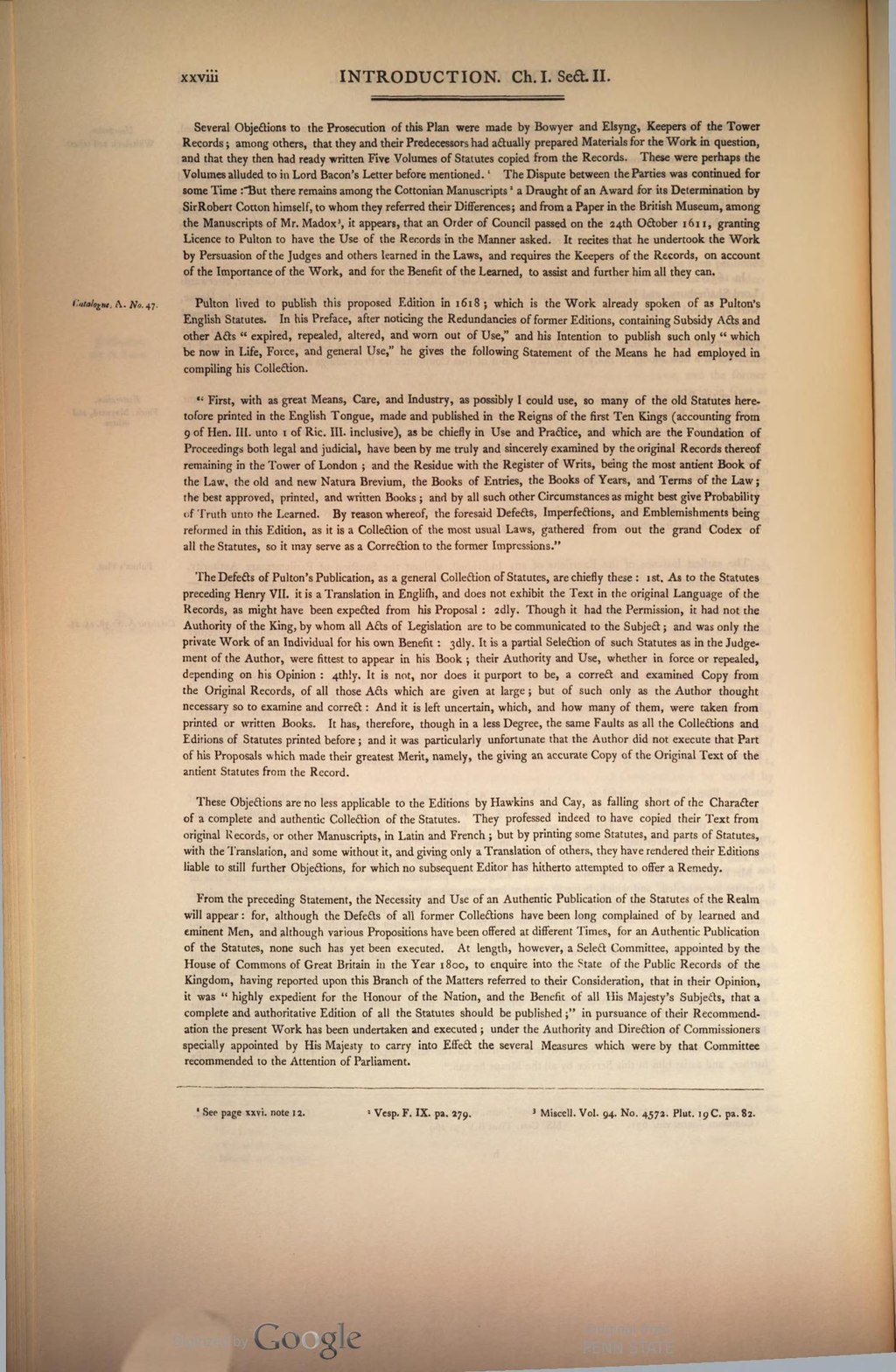Several Objections to the Prosecution of this Plan were made by Bowyer and Elsyng, Keepers of the Tower Records; among others, that they and their Predecessors had actually prepared Materials for the Work in question, and that they then had ready written Five Volumes of Statutes copied from the Records. These were perhaps the Volumes alluded to in Lord Bacon’s Letter before mentioned.[1] The Dispute between the Parties was continued for some Time: But there remains among the Cottonian Manuscripts[2] a Draught of an Award for its Determination by Sir Robert Cotton himself, to whom they referred their Differences; and from a Paper in the British Museum, among the Manuscripts of Mr. Madox[3], it appears, that an Order of Council passed on the 24th October 1611, granting Licence to Pulton to have the Use of the Records in the Manner asked. It recites that he undertook the Work by Persuasion of the Judges and others learned in the Laws, and requires the Keepers of the Records, on account of the Importance of the Work, and for the Benefit of the Learned, to assist and further him all they can.
Pulton lived to publish this proposed Edition in 1618; which is the Work already spoken of as Pulton’s English Statutes. In his Preface, after noticing the Redundancies of former Editions, containing Subsidy Acts and other Acts “expired, repealed, altered, and worn out of Use,” and his Intention to publish such only “which be now in Life, Force, and general Use,” he gives the following Statement of the Means he had employed in compiling his Collection.
“First, with as great Means, Care, and Industry, as possibly I could use, so many of the old Statutes heretofore printed in the English Tongue, made and published in the Reigns of the first Ten Kings (accounting from 9 of Hen. III. unto 1 of Ric. III. inclusive), as be chiefly in Use and Practice, and which are the Foundation of Proceedings both legal and judicial, have been by me truly and sincerely examined by the original Records thereof remaining in the Tower of London; and the Residue with the Register of Writs, being the most antient Book of the Law, the old and new Natura Brevium, the Books of Entries, the Books of Years, and Terms of the Law; the best approved, printed, and written Books; and by all such other Circumstances as might best give Probability of Truth unto the Learned. By reason whereof, the foresaid Defects, Imperfections, and Emblemishments being reformed in this Edition, as it is a Collection of the most usual Laws, gathered from out the grand Codex of all the Statutes, so it may serve as a Correction to the former Impressions.”
The Defects of Pulton’s Publication, as a general Collection of Statutes, are chiefly these: 1st, As to the Statutes preceding Henry VII. it is a Translation in Engliſh, and does not exhibit the Text in the original Language of the Records, as might have been expected from his Proposal: 2dly. Though it had the Permission, it had not the Authority of the King, by whom all Acts of Legislation are to be communicated to the Subject; and was only the private Work of an Individual for his own Benefit: 3dly. It is a partial Selection of such Statutes as in the Judgement of the Author, were fittest to appear in his Book; their Authority and Use, whether in force or repealed, depending on his Opinion: 4thly. It is not, nor does it purport to be, a correct and examined Copy from the Original Records, of all those Acts which are given at large; but of such only as the Author thought necessary so to examine and correct: And it is left uncertain, which, and how many of them, were taken from printed or written Books. It has, therefore, though in a less Degree, the same Faults as all the Collections and Editions of Statutes printed before; and it was particularly unfortunate that the Author did not execute that Part of his Proposals which made their greatest Merit, namely, the giving an accurate Copy of the Original Text of the antient Statutes from the Record.
These Objections are no less applicable to the Editions by Hawkins and Cay, as falling short of the Character of a complete and authentic Collection of the Statutes. They professed indeed to have copied their Text from original Records, or other Manuscripts, in Latin and French; but by printing some Statutes, and parts of Statutes, with the Translation, and some without it, and giving only a Translation of others, they have rendered their Editions liable to still further Objections, for which no subsequent Editor has hitherto attempted to offer a Remedy.
From the preceding Statement, the Necessity and Use of an Authentic Publication of the Statutes of the Realm will appear: for, although the Defects of all former Collections have been long complained of by learned and eminent Men, and although various Propositions have been offered at different Times, for an Authentic Publication of the Statutes, none such has yet been executed. At length, however, a Select Committee, appointed by the House of Commons of Great Britain in the Year 1800, to enquire into the State of the Public Records of the Kingdom, having reported upon this Branch of the Matters referred to their Consideration, that in their Opinion, it was “highly expedient for the Honour of the Nation, and the Benefit of all His Majesty’s Subjects, that a complete and authoritative Edition of all the Statutes should be published;” in pursuance of their Recommendation the present Work has been undertaken and executed; under the Authority and Direction of Commissioners specially appointed by His Majesty to carry into Effect the several Measures which were by that Committee recommended to the Attention of Parliament.
